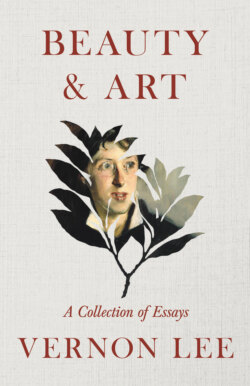Читать книгу Beauty & Art - A Collection of Essays - Vernon Lee - Страница 22
На сайте Литреса книга снята с продажи.
XVI
ОглавлениеArt can thus train the soul because art is free; or, more strictly speaking, because art is the only complete expression, the only consistent realisation of our freedom. In other parts of our life, business, affection, passion, pursuit of utility, glory or truth, we are for ever conditioned. We are twisting perpetually, perpetually stopped short and deflected, picking our way among the visible and barely visible habits, interests, desires, shortcomings, of others and of that portion of ourselves which, in the light of that particular moment and circumstance, seems to be foreign to us, to be another's. We can no more follow the straight line of our wishes than can the passenger in Venice among those labyrinthine streets, whose everlasting, unexpected bends are due to canals which the streets themselves prevent his seeing. Moreover, in those gropings among looming or unseen obstacles, we are pulled hither and thither, checked and misled by the recurring doubt as to which, of these thwarted and yielding selves, may be the chief and real one, and which, of the goals we are never allowed finally to touch, is the goal we spontaneously tend to.
Now it is different in the case of Art, and of all those æsthetic activities, often personal and private, which are connected with Art and may be grouped together under Art's name. Art exists to please, and, when left to ourselves, we feel in what our pleasure lies. Art is a free, most open and visible space, where we disport ourselves freely. Indeed, it has long been remarked (the poet Schiller working out the theory) that, as there is in man's nature a longing for mere unconditioned exercise, one of Art's chief missions is to give us free scope to be ourselves. If therefore Art is the playground where each individual, each nation or each century, not merely toils, but untrammelled by momentary passion, unhampered by outer cares, freely exists and feels itself, then Art may surely become the training-place of our soul. Art may teach us how to employ our liberty, how to select our wishes: employ our liberty so as to respect that of others; select our wishes in such a manner as to further the wishes of our fellow-creatures.
For there are various, and variously good or evil ways of following our instincts, fulfilling our desires, in short, of being independent of outer circumstances; in other words, there are worthy and worthless ways of using our leisure and our surplus energy, of seeking our pleasure. And Art—Art and all Art here stands for—can train us to do so without injuring others, without wasting the material and spiritual riches of the world. Art can train us to delight in the higher harmonies of existence; train us to open our eyes, ears and souls, instead of shutting them, to the wider modes of universal life.
In such manner, to resume our symbol of the bay laurel which the road-mender stuck on to the front of that tramcar, can our love for the beautiful avert, like the plant of Apollo, many of the storms, and cure many of the fevers, of life.
